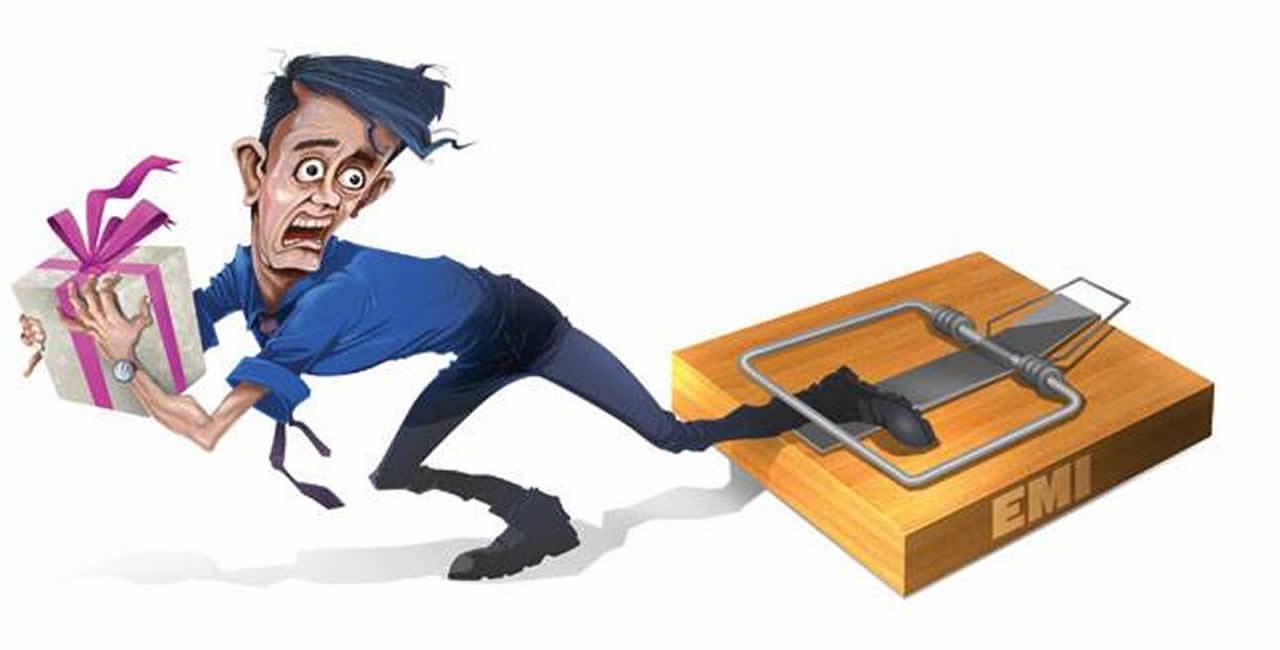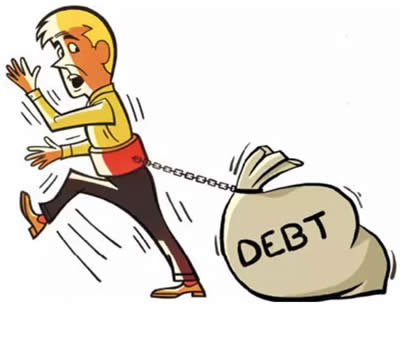
Buying on credit has become the norm of modern society. The increased availability of credit is responsible for higher levels of debt burden on households. Aggressive marketing campaigns and hire purchases have urged many families to indulge in debts. Shocking statistics from the Household Budget Survey: Analytical Report 2017 have revealed that some 40% of households are indebted in Mauritius.
According to recent statistics, a larger proportion of households were indebted for audio-visual equipment (from 9.9% in 2012 to 12.1% 2017), household appliances (from 17.5% in 2012 to 22.9% in 2017) and furniture (from 14.3% in 2012 to 14.9% in 2017). Besides, on average, an indebted household disbursed Rs 7,524 per month on debt repayment in 2017, 10.2% higher than the monthly loan repayment of Rs 6,830 in 2012.

Suttyhudeo Tengur, director of the Association against the Protection of Environment and Consumers (APEC), explains that the household debts keep on increasing because firstly, people want to improve their quality of life, especially at home. “Gone are the days where people used wood as fuel to cook their food. Today, almost every household goes for either gas or electrical cooking. This is a normal societal evolution for the betterment of social life. This is one of the reasons why household debts are on the rise. But unfortunately, there are a lot of people who buy unnecessary things, which keep their debts rising. Consumers should be more judicious in their choices, especially when it comes to spending on hire purchases.”
Debt Recovery Specialist Shameema Gobindram-Namooya advances that as a society, we want to wear the best fashion labels, have the latest iPhones, and BMW’s. Somehow, the premium brands somehow give us importance. “In the past, we would save until we had enough money to buy a TV, video player, car, among others. Now, it is all about instant gratification. We need to impress others. Ultimately, we have to ask ourselves if that actually makes us happy.”
Shameema Gobindram-Namooya utters that people like convenience. “If you speak to our elders, they will say that we lack ‘patience’. They probably have a point. I can speak to my family across the globe instantly via Skype, WhatsApp, Facebook and so on. Only 25 years ago, it would be via telephone at a high cost. It's the convenience that can lead to temptation. The marketing strategy is simply playing with our emotions, that inner demon: Why wait a few months, when you can have your 65-inch TV now? There will always be temptation, something bigger, brighter and better than before. We have to take a moment, look in the mirror and ask: ‘Do I really need this?’ ‘Why can't I wait a few more months for this’?”

Economic and social Impact
Economist Nem Boodeo explains that increasing household debt can have numerous economic and social consequences. First, higher debts result in lower disposable income, he says. “The lower the disposable income, the lower will be the ability of consumers and households to satisfy their needs and therefore higher sacrifice for their desired items. Over time, this economic retrenchment results in deeper psychological and emotional instability. As the table above points, in Mauritius, a major component of household debt is housing loans, followed by loans for car purchase and domestic appliances.”
He further argues that the highest 20% of income earners are not spared from this phenomenon. “While there exists some return from owning an immovable property, the current sacrifice might be low, moderate or severe depending on the level of income. The return on this investment needs to be assessed against the cost of owning the property, which is the interest rate on the debt (plus any charges levied by the Government). Investment in real estate also represents lower investment in stock and shares diminishing the potential for financial sector development in the country.”
The social impact can be more detrimental and can take the form of added stress, uncertainty of the future and “accepting one’s fate,” which might point out towards the repressive livelihood of individuals, spelled out in situations inappropriate to the context, such as road rage, family disputes and even conflicts among young couples, he states.

Suttyhudeo Tengur explains that every household should plan its budget to meet the basic requirements of food, medical expenses and other related expenses for public utilities. “Every cent spent outside these basic needs has to be carefully considered. It would be unwise for consumers to throw money for waste products or unwanted services. This sort of situation will be difficult for them to make both ends meet. Very often, people are short of money ten days or a fortnight before the next pay day. And in case of emergency, like for example an urgent medical treatment, they will have to look for some financial help from close relatives or elsewhere.”
The Hire Purchase trap
For the economist Nem Boodeo, hire purchase can be a blessing or a disguise depending on how well informed the purchaser is. “The majority of low-income households are indebted due to the purchase of audio-visual and consumer durables. The important aspects of hire purchase are the interest rate customers have to pay. As an example, a 12% interest rate is effectively high while the real interest rate on deposits or other investments might be very low. However, there is more to this. It is also about how urgently customers want to satisfy their needs. Irrespective of the motivation behind consumption decisions, it is not only the ability and willingness that matters but also the urgency of the desired outcome.”
He highlights that a zero deposit scheme is compelling, but the contract is an important part of the process. “People and households need to make informed judgements about their financial situation before embarking on such a process. The monthly repayment, the interest rate, the number of years of hire purchase and the extra payment required are variables commanding a high degree of fatality if missed out. Hire purchase might not necessarily be a trap as long as the conditions are known and respected by both parties. People/households have to weigh the urgency of their needs to their effective consumption.”
Dr Brendan Maartens states that hire purchases, like all forms of credit, are often treated by people as ‘free’ money. It’s not free money. “It is money that you have to earn in the future to pay for the product or service that you wish to have in the present. They also have to ask themselves whether it would be more sensible to save up money instead, to allow them to buy this product or service outright. We invariably end up paying more for hire purchase or delay purchase, but if we buy outright, we get the best deal we can and do not accrue any debt in the process.”
 Michel Hardy : “It is a growing concern”
Michel Hardy : “It is a growing concern”
Michel Hardy, Vice-President of APEA (Association pour la Protection des Emprunteurs Abusés) has witnessed various households which have submerged under the burden of debts due to hire purchases. “This is becoming a growing concern. Some people are buying the latest technological products at their own detriment. There have been cases where people bought a TV or a smartphone and are unable to pay. If they have not paid 50% of the price of the product, the company takes it back or they have to look for a way to pay for the product even if they have to face difficulties.”
He asks all individuals not to fall prey to advertising and start buying without thinking about the consequences. “Take your time before buying. Do not get easily influenced by marketing.”

Dealing with household debts
According to CSO, HBS 2017, the lower and middle-income classes have the same percentage of household debt as high income class, which is around 15%, says Nem Boodeo. “This category of income earners has their own attributes and are mostly indebted due to housing loans and hire purchase for household durables. From another perspective, low and middle-income families are engaging in short-term debts rather than higher income families who engage in longer-term debts. Technological advances, social media, advertising and converging global demand play a significant role in pushing households into higher debt obligations.”
 He further explains that debts which pay for themselves are mostly advisable. “Assets which generate enough income to pay off debt repayment are preferred over the range of such affiliates. On the other hand, a debt taken for an opportunity to generate a return, provided the return is higher than the debt repayment in real terms is also preferred.”
He further explains that debts which pay for themselves are mostly advisable. “Assets which generate enough income to pay off debt repayment are preferred over the range of such affiliates. On the other hand, a debt taken for an opportunity to generate a return, provided the return is higher than the debt repayment in real terms is also preferred.”
He argues that a temporary debt is preferable to a decades-scale debt. “So if households are taking temporary debt for consumer durables, this might not be necessarily bad. Debt is a service sold by financial companies. Nonetheless, the terms and conditions are all relevant aspects of the deal. In a market driven economy, customers have to know their rights, how to stand for their rights and the right direction to follow. Clear and transparent policies with ease of customer adaptability and use should be the focus of regulatory bodies. After all, they are ‘indebted’ towards the population for their existence and running expenses.”
Dr Brendan Maartens explains that greater levels of media literacy among audience and consumers should be encouraged. “Ideally, this work would begin in schools, with children being taught to distinguish between different types of claims found in different types of advertising. There is a currently a big push to extend media literacy programmes in the UK and the US. I would argue that incorporating advertising into these literacy programmes is also advisable, partly because advertising plays such a dominant role in our culture and partly because it can but crucially does not always – convince people to buy certain products or services that they might not otherwise purchase or indeed need.”
Giving advice on how to avoid being duped into hire purchases, he suggests three things. “Only purchase essential, not luxury, products or services. A car that allows you to drive to work is essential. A newer model of the latest iPhone isn’t. Second, consumers should understand that they always end up paying more overall if they defer payment or break payment down into successive instalments. Credit, like the products and services themselves, is never free, and the lower the monthly repayment rate or the longer the delay in repayment, the more a consumer will have to pay in total. Third, before making a purchase, all consumers should read and then read again the contract the business supplies them to authorise the transaction.”
Suttyhudeo Tengur recalls that money is a good servant but a bad master. “It you have a look at the latest statistics of the Household Budget Survey, you will find out that those at the lowest rung of the ladder are more indebted on housing and home appliances. But for the middle higher income group, the trend of debt for housing is much higher. As housing is one of the basic needs, it is quite normal for those who do not either own a plot of land or a house will contract debts to feel gratified.”
Shameema Gobindram-Namooya, on her part, puts forward that people should bear in mind that the longer the agreement, the more you will pay in interest. “You have to calculate how affordable this is for you. Are you prepared to pay 10-20% more for something that will ultimately be worthless at the end of the term? We need the discipline to ask ourselves: Why do I need this? Can I afford this? Can I pay this off early and save on the interest payments? Socially, you can see the ramifications in Europe. In the UK, there are schools already banning certain brands of jackets (selling for £800+), to curb down bullying, and kids trying to compete with each other. I see first-hand how debt can affect your life, your work, everything. My company, Sogerec Ltd, deals with these cases every day. It weighs on you. If it’s not managed correctly and with ‘eyes wide open’, it quickly spirals out of control. My advice will always be, if you’re buying something, make sure it’s for the right and meaningful reasons. We have been given the chance at life, appreciate what it has to offer, embrace technology, and social media, but don’t let it dominate you.”
 J'aime
J'aime














